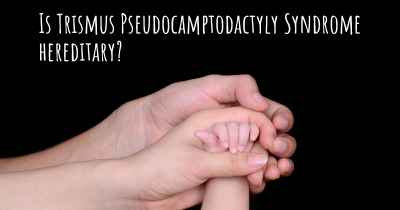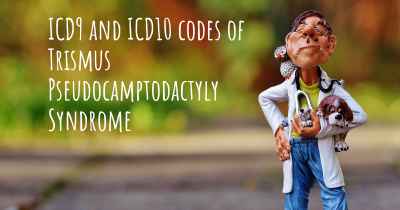Which advice would you give to someone who has just been diagnosed with Trismus Pseudocamptodactyly Syndrome?
See some advice from people with experience in Trismus Pseudocamptodactyly Syndrome to people who have just been diagnosed with Trismus Pseudocamptodactyly Syndrome

Advice for Someone Diagnosed with Trismus Pseudocamptodactyly Syndrome
Coping with a new diagnosis can be overwhelming, especially when it comes to a rare condition like Trismus Pseudocamptodactyly Syndrome (TPS). While I'm not a medical professional, I can offer some general advice and suggestions to help you navigate this journey.
1. Educate Yourself
Knowledge is power, so take the time to understand TPS. Research reputable sources, consult medical professionals, and join support groups or online communities dedicated to rare diseases. This will help you gain insights into the condition, its symptoms, treatment options, and potential management strategies.
2. Build a Support Network
Surround yourself with a strong support system. Share your diagnosis with your loved ones, friends, and colleagues. Their understanding, empathy, and encouragement can make a significant difference in your journey. Consider joining local or online support groups where you can connect with others who have TPS or similar conditions.
3. Communicate with Your Healthcare Team
Establish open and honest communication with your healthcare professionals. They are your partners in managing TPS. Regularly discuss your symptoms, concerns, and treatment options with them. Seek their guidance on pain management, physical therapy, and any other interventions that may help improve your quality of life.
4. Focus on Self-Care
Make self-care a priority. This includes maintaining a healthy lifestyle, getting enough rest, eating a balanced diet, and engaging in activities that bring you joy and relaxation. Prioritize your mental and emotional well-being by exploring stress management techniques, such as meditation, mindfulness, or therapy.
5. Adapt and Modify
TPS may present physical challenges, such as limited jaw movement or finger deformities. Work with occupational therapists and other specialists to explore adaptive devices, assistive technologies, or modifications that can help you overcome these challenges. These may include specialized utensils, splints, or exercises tailored to your needs.
6. Seek Emotional Support
Living with a rare condition can be emotionally taxing. Consider seeking professional counseling or therapy to help you navigate the emotional aspects of your diagnosis. Therapists can provide coping strategies, emotional support, and a safe space to discuss your fears, frustrations, and hopes.
7. Stay Positive and Seek Opportunities
While TPS may present challenges, it's important to maintain a positive mindset. Celebrate small victories, focus on what you can do, and seek opportunities for personal growth. Engage in hobbies, pursue education, or explore new interests that align with your abilities and passions.
8. Advocate for Yourself
Become your own advocate. Learn about your rights, available resources, and support systems. Stay informed about advancements in TPS research and treatment options. If necessary, reach out to patient advocacy organizations or rare disease foundations for guidance and support.
9. Stay Hopeful
Remember that medical research and understanding of rare conditions are constantly evolving. Stay hopeful and optimistic about potential breakthroughs, new treatments, and improved management strategies. Connect with the TPS community to share experiences, stories of resilience, and hope for the future.
Remember, this advice is not a substitute for professional medical guidance. Always consult with your healthcare team for personalized advice and treatment options specific to your condition.








